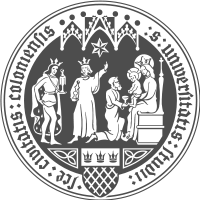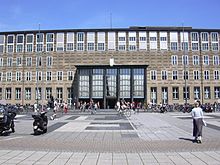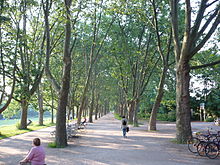- University of Cologne
-
University of Cologne Universität zu Köln 
university seal of 1392Latin: Universitatis Coloniensis Established 1388/1919
Closed 1798—1919Rector Axel Freimuth Academic staff 508 Students 44,228 (WS 2006/07) Postgraduates 3,718 Location Cologne, NRW, Germany Website www.uni-koeln.de The University of Cologne (German Universität zu Köln) is one of the oldest universities in Europe and, with over 44,000 students, one of the largest universities in Germany. The university is part of the Deutsche Forschungsgemeinschaft, an association of Germany's leading research universities. It is furthermore the German founding member of the Community of European Management Schools and International Companies (CEMS).
Contents
History
1388–1798
The University of Cologne was established in 1388 as the fourth university in the Holy Roman Empire, after the Charles University of Prague (1348), the University of Vienna (1365) and the Ruprecht Karl University of Heidelberg (1386). The charter was signed by Pope Urban VI. The university began teaching on January 6, 1389. In 1798, the university was abolished by the French, who had invaded Cologne in 1794, because under the new French constitution, universities were abolished all over France.The last rector Ferdinand Franz Wallraf was able to preserve the university’s Great Seal, now once more in use.
1919–today
In 1919, the by-then Prussian government endorsed a decision by the Cologne City Council to re-establish the university. On May 19, 1919, the then Cologne Mayor Konrad Adenauer signed the charter of the modern university.
At that point, the new university was located in Neustadt-Süd, but relocated to its current campus in Lindenthal on 2 November 1934. The old premises are now being used for the Cologne University of Applied Sciences.
Initially, the university was composed of the Faculty of Commerce, Economics and Social Sciences (successor to the Institutes of Commerce and of Communal and Social Administration) and the Faculty of Medicine (successor to the Academy of Medicine). In 1920, the Faculty of Law and the Faculty of Arts were added, from which latter the School of Mathematics and Natural Sciences was split off in 1955 to form a separate Faculty. In 1980, the two Cologne departments of the Rhineland School of Education were attached to the university as the Faculties of Education and of Special Education. In 1988, the university became a founding member of the Community of European Management Schools and International Companies (CEMS), today's Global Alliance in Management Education.
The University is a leader in the area of economics and is regularly placed in top positions for law and commerce, both for national and international rankings.
Organization
The University of Cologne is a statutory corporation (Körperschaft des öffentlichen Rechts), operated by the Federal State of North Rhine-Westphalia.
Faculties
The university is divided into six faculties, which together offer 200 fields of study. The faculties are those of Management, Economics and Social Sciences, Law, Medicine (with the affiliated University clinic), Arts, Mathematics and Natural Sciences and Human Sciences.
faculty students website  Faculty of Management, Economics and Social Sciences
Faculty of Management, Economics and Social Sciencesca. 10,000 German English  Faculty of Law
Faculty of Lawca. 5,000 German  Faculty of Medicine with University Hospital of Cologne
Faculty of Medicine with University Hospital of Cologneca. 3,200 German English  Faculty of Arts and Humanities
Faculty of Arts and Humanitiesca. 16,500 German  Faculty of Mathematics and Natural Sciences
Faculty of Mathematics and Natural Sciencesca. 7,500 German English Faculty of Human Sciences ca. 2,800 German Rectors
On November 24, 2004, Axel Freimuth was elected as the Rector of the University. His four-year term began on April 1, 2005. He succeeded Tassilo Küpper and is the 49th Rector since 1919. He was previously Dean of Mathematics and Natural Sciences.
Students and faculty
In 2005, the University enrolled 47,203 students, including 3,718 graduate students. In 2003, the number of post-doctoral students was 670.
The number of international students was 6,157 in the Summer Semester of 2005. This amounts to approximately 13% of the total students. Those from developing countries made up about 60%, representing a total of 123 nations. The largest contingents came from Bulgaria (10.5%), Russia (8.8%), Poland (7.4%), China (6.2%) and Ukraine (5.7%).
There are 508 professors at the university, including 70 women. In addition, the university employs 1,549 research assistants, with an additional 765 at the clinic, and 1,462 other assistants (3,736 at the clinic).
Partner universities
The University of Cologne maintains eighteen official partnerships[1] with universities from ten countries. Of these, the partnerships with Clermont-Ferrand I and Pennsylvania State are the oldest partnerships. In addition, Cologne has further cooperations[2] with more than 260 other universities.
- Universidade Federal do Ceará, Fortaleza (since 1990)
- Sofia University St. Kliment Ohridski, Sofia (since 1985)
- Sun Yat-sen University, Guangzhou (since 2005)
- Université d'Auvergne, Clermont-Ferrand I (since 1962)
- Université Blaise Pascal, Clermont-Ferrand II (since 1980)
- Aristotelio Panepistimo, Thessaloniki (since 1992)
- National Law School of India University, Bangalore
- Hitotsubashi University, Tokyo (since 1987)
- Keio University, Tokyo (since 1981)
- Uniwersytet Wroclawski, Breslau (since 2003)
- Uniwersytet Jagiellonski w Krakowie, Kraków (since 1990)
- Gorkij Literaturnyj Institute, Moscow
- Volgograd State University (since 1993)
- Charles University, Prague (since 1999)
- Istanbul Üniversitesi, Istanbul (since 2003)
- University of California at Berkeley, School of Law, Berkeley, CA
- Duquesne University, Pittsburgh, PA (since 2001)
- Pennsylvania State University, State College, PA (since 1961)
Notable alumni and professors
Over the centuries, scholars from Cologne have been among the most prominent in their fields, beginning with Albertus Magnus and his pupil Thomas Aquinas (both 13th century). Notable alumni of the 20th century include among others Kurt Alder (Nobel Prize in Chemistry 1950), Peter Grünberg (Nobel Prize in Physics 2007), Heinrich Böll (Nobel Prize for Literature), Karl Carstens (president of the Federal Republic of Germany 1979–1984), Gustav Heinemann (president of the Federal Republic of Germany 1969 to 1974), Karolos Papoulias (current president of the Hellenic Republic), Amos Grunebaum (famous US obstetrician), and Erich Gutenberg (founder of modern German business studies).
See also
Literature
University history
- Erich Meuthen: Kölner Universitätsgeschichte, Band I: Die alte Universität, 1988, ISBN 3-412-06287-1
- Bernd Heimbüchel und Klaus Pabst: Kölner Universitätsgeschichte, Band II: Das 19. und 20. Jahrhundert, 1988, ISBN 3-412-01588-1
- Erich Meuthen (Hrsg.): Kölner Universitätsgeschichte, Band III: Die neue Universität – Daten und Fakten, 1988, ISBN 3-412-01688-8
References
External links
- Website of the University of Cologne (English)
- Absolventennetzwerk der Universität zu Köln (German)
Vienna University of Economics and Business · Louvain School of Management · University of Economics, Prague · Copenhagen Business School · Helsinki School of Economics · HEC Paris · University of Cologne · London School of Economics · Corvinus University of Budapest · Michael Smurfit Graduate Business School · Bocconi University · Rotterdam School of Management · Norwegian School of Economics · Warsaw School of Economics · Stockholm School of Economics · ESADE · University of St. Gallen · Koç University · Richard Ivey School of BusinessCategories:- 1388 establishments
- Educational institutions established in 1919
- University of Cologne
- Universities in Germany
- Universities and colleges in North Rhine-Westphalia
- Lindenthal, Cologne
- Educational institutions established in the 14th century
Wikimedia Foundation. 2010.




